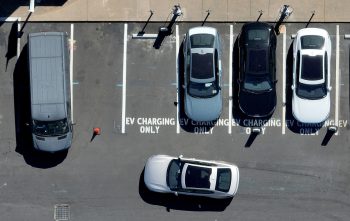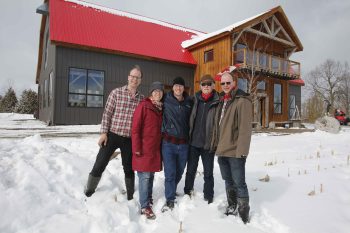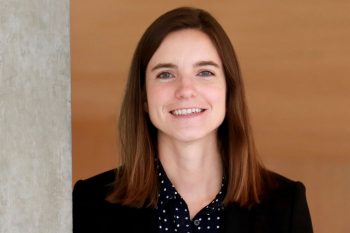Professor Birsen Donmez of the Department of Mechanical & Industrial Engineering wants you to be a better driver. She’s thinking about sending you a report card.
Not really — but she is brainstorming ways to provide feedback to drivers on how they’re doing. She’s teamed up with Skymeter, a Canadian technology firm, to figure out how to measure driving style.
“I am interested in helping people be safer drivers by providing feedback to them based on how they drive,” she says. “If we can identify behaviours that are not safe and provide feedback to the driver in a consistent manner, then we might be able to change their behaviour in the long run.”
Her work has been given a big boost by funding from The Federal Economic Development Agency of Southern Ontario (FedDev). Peter Van Loan, leader of the government in the House of Commons was on campus today to announce funding for Professor Donmez’s project and 13 others.
We all get feedback when we drive — speeding tickets, perhaps even accidents. Professor Donmez wants to provide regular feedback that will prevent these more dramatic outcomes. Her work is in its early stages, so she doesn’t know yet whether it’s best to provide real time feedback, which would allow the driver to make corrections but could potentially be distracting, or to provide some kind of regular reporting.
Ben Grush is a member of the board of directors of Skymeter, a company that uses telemetrics — measuring from a distance — to measure automobile use. For example, Skymeter has installed meters to help car sharing companies measure and bill for usage. His company is interested in branching out and measuring driver behaviour. To extend the car-sharing example, Grush says, “Imagine it costs $15 to use a car for an hour. You might take the car shopping and only go a short distance. I might go a long distance and drive very aggressively. If we could measure that, we might pay differently depending on how we use the car.”
The goal for both Grush and Professor Donmez is a “driver style index.” Grush’s company has technology that can potentially make such a measurement by quantifying things like rapid acceleration or aggressive braking, but they don’t know how reliable it is.
“We needed help to develop this index,” says Grush. “The research has to be unbiased. It has to be published and reviewed. We needed someone outside the company.”
There are lots of potential applications of a driver style index — imagine a meter in your car that reported back to you. In addition to making your driving safer, you could give your insurance company permission to access the data, potentially resulting in lower rates.
The collaboration between Professor Donmez, Grush and U of T students Maryam Merrikhpour and Farzan Sasangohar was made possible by funding from FedDev’s Applied Research and Commercialization Initiative (ARC). FedDev was launched in August 2009 to help respond to Ontario’s economic challenges and the ARC is a pilot initiative aimed at addressing the gap between research and commercialization in southern Ontario and encouraging collaboration between small- and medium-sized businesses and post-secondary institutions.
“At the University of Toronto, we’re always looking for ways to make research meaningful to the wider community,” said Professor Peter Lewis, U of T’s Associate Vice-President (Research). “By working together with businesses, we’re accelerating the movement of ideas to the marketplace, for the benefit of all Ontarians. So we are delighted with the news of this generous investment. With this funding, our researchers, together with their private sector collaborators, are helping to create a prosperous, innovative future.”
Grush and Professor Donmez echoed Professor Lewis’s thanks. “It’s very important for Ontario companies like ours to get this kind of support, because we are job generators,” said Grush. “Canada does a lot of high-tech export so bringing universities and industry together creates wealth for everyone in the end.”
Professor Donmez noted that the funding will allow her to support several students working on the project. The U of T Engineering recipients are:
- Professor Tom Chau of the Institute of Biomaterials & Biomedical Engineering/Holland Bloorview Kids Rehabilitation Hospital and Syngrafii Corporation for “Demographic Analysis of Handwriting BioAuthentication Characteristics.”
- Professor Birsen Donmez of the Department of Mechanical & Industrial Engineering and Skymeter for “Identifying risky driving styles through a GPS-enabled telematics platform.”
- Professor Ridha Ben Mrad of the Department of Mechanical & Industrial Engineering and Sensor Technology Ltd for “Piezoelectric for Energy Harvester for Self-powered Electronics.”
- Professor Joyce Poon of The Edward S. Rogers Sr. Department of Electrical & Computer Engineering, Venkat Venkataramanan of the Institute for Optical Sciences and Mircom Ltd. for “Photo Electric Smoke Detectors.”
- Professor Harry Ruda of the Department of Materials Science & Engineering and Solar Grid Inc. for “High Efficiency Optimized Solar Cells (HELIOS).”
- Professor Pierre Sullivan of the Department of Mechanical & Industrial Engineering and Engineering Services Inc. for “Mini Ion Mobility Spectrometer for Frontline Health Care.”



